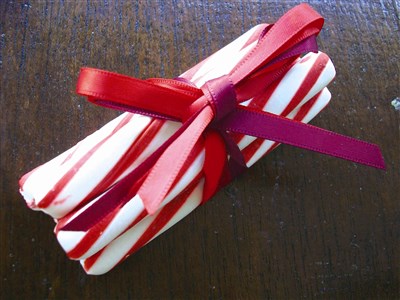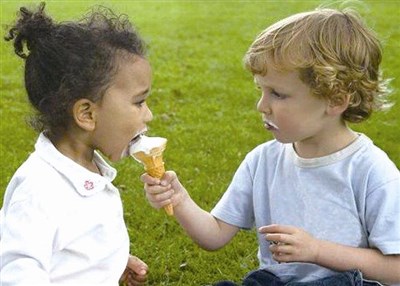 break up
「break up」 是「打碎」,例如:「The teacher broke up the big candy and give each student a small piece.(老師將大糖果弄碎,給每一個學生一塊。)圖/香海文化
break up
「break up」 是「打碎」,例如:「The teacher broke up the big candy and give each student a small piece.(老師將大糖果弄碎,給每一個學生一塊。)圖/香海文化
 crushed
「break up」是分成小塊,「crush」 則是「粉碎」。圖/香海文化
crushed
「break up」是分成小塊,「crush」 則是「粉碎」。圖/香海文化
 share
「share」 是「一部分」,例如:「He has done his share of the work.」 (他已經做好他分內的工作。)圖/香海文化
share
「share」 是「一部分」,例如:「He has done his share of the work.」 (他已經做好他分內的工作。)圖/香海文化
小故事‧大啟示
如果我們得到了什麼利益,願意和別人分享,才是實實在在的擁有。分享的快樂,勝過獨自擁有,分享才是保護自己的財富,也是讓自己在安享財富之時,獲得施予的快樂。各位小朋友,如果你有什麼好的東西,記得要跟周遭的人一起分享喲!──慈惠法師
中文/慈惠法師
英文/妙光法師、
Translated into English by: FGS Institute of Humanistic Buddhism
A story in the Buddhist sutra once mentioned about a farmer, who went to his field early in the morning to work. As he turned over the soil, his hoe knocked on something hard.
At first, he thought it was a rock. When he sifted the soil and took a good look, he realized it was a big heavy gold bar. On the bar, there was inscription of words, explaining that there was once a wealthy family, who buried this giant gold bar under the ground.
The farmer was very happy to find this gold bar by accident. However, this gold bar was so big that it was very hard to move it. He tried to lift the gold bar a few times, but he could only lift it halfway and it would fall back to the ground. He was almost crushed by this gold bar.
Then, he thought to himself. “I cannot take this gold bar away all by myself. I might even get myself killed. Wouldn’t it be easier if I break up the gold and take it home in pieces?
Therefore, the farmer broke the gold bar into four pieces and thought, “I will take one piece for the living expenses of my family, and one for starting up a business for our future needs. Since the gold bar is found in the village, I should use one piece to repair the roads, and construct some public facilities for the villagers. I can offer the last piece to society and help those in need.”
With such kind thoughts, the gold bar was chopped into four pieces. Hence, it was easier to carry home.
What is the moral of the story? In society, all of our achievements actually come from the support and help of others. Therefore, we need to be grateful and repay them.
As the saying goes, “I shall share all gains achieved today with others.”
Venerable Master Hsing Yun often tells his disciples, “Instead of mere possession, sharing makes the world much more beautiful.”
All of these tell us that it is much better to share all things that are good, happy, joyful, and beneficial. Sharing much better than possession, because those are unwilling to share will never find true happiness.
翻譯
佛經裡有則故事說到,一個農夫早上出門到田裡耕作,當他在翻土時,鋤頭突然碰到非常硬的東西。
起初,他以為是塊大石頭,等翻開土仔細瞧,才發現原來是一塊既大又重的黃金,金塊上面刻著一段文字,內容說明過去這地方,曾有一戶富有人家,富翁在地底下埋了這塊大黃金。
農夫意外得到這塊黃金,開心極了。
可是,黃金實在太大,不容易搬動,有幾次好不容易抬起來,可是抬不到一半又掉了下去,人差一點被黃金壓死。
這時候,他想:「這麼大一塊黃金,我一個人也帶不走,搞不好還會被它壓死。乾脆把它分成小塊,不就可以搬走了嗎?」
於是,農夫把黃金敲成四塊,心想:「一塊我要搬回家,作為家計生活之用;一塊留著做生意,以防未來不時之需;既然黃金是在村子裡發現,我應該把路給修好,為村民做些公共設施,就拿其中一塊去做這些事情吧;最後一塊,我可以把它貢獻社會,幫助一些孤苦殘障的人。」
農夫因為一念善心生起,把黃金分成四塊,因此很容易就把黃金搬回家。
這個譬喻說明什麼呢?我們在社會上能夠有所成就,其實都是依賴眾人的力量協助,因此要懂得感恩回饋。
社會上有一句話說得好:「我要將今天的收穫所得,跟大家一起分享。」星雲大師也常常告訴弟子們:「不要獨自占有,享有就好了,因為『享有』比『擁有』更美。」
這些話就是告訴我們,凡有好處、有快樂、有開心、有利益的事情,何妨跟別人分享,只要享有,不一定要擁有,慳吝不肯分享的人,其實並沒有得到真正的快樂。
break up
「break up」 是「打碎」,例如:「The teacher broke up the big candy and give each student a small piece.(老師將大糖果弄碎,給每一個學生一塊。)
「break up」 也當作「結束」,例如:「The weather shows signs of breaking up.」(看樣子,這段時期的好天氣要結束 了。)
「break up」 也是「放假」,例如:「When do you break up for Summer vacation?」(你們什麼時候放暑假?)
WOW!原來如此
share
crushed
「break up」是分成小塊,「crush」 則是「粉碎」。
文中的:「The farmer was almost crushed by this gold bar.(農夫幾乎被這金塊壓壞。)」形容巨大的力量險些造成「肢」離破碎的慘劇。「crush」 也是「極度擁擠」的意思,例如:「There was such a crush in the classroom that no one could move.」(教室內擠得水洩不通,誰也無法動彈。)另外,通常是譯為「擠壓」的「crush」,在美式俚語裡,意思變成「痴迷」例如:「I got a crush on you.」就是「我對你著迷」的意思。
share
「share」 是「一部分」,例如:「He has done his share of the work.」 (他已經做好他分內的工作。)
「share」 也有「共同使用、一人一半」的意味,例如:「The bonus was shared out between them. 」(這筆獎金由他們兩人均分。)
「share」是分享也是分擔,也就是「禍福與共」。例如:「He shared with me in distress.」(他與我共患難。)或:「We shared in her joy.」(我們分享她的喜悅。)